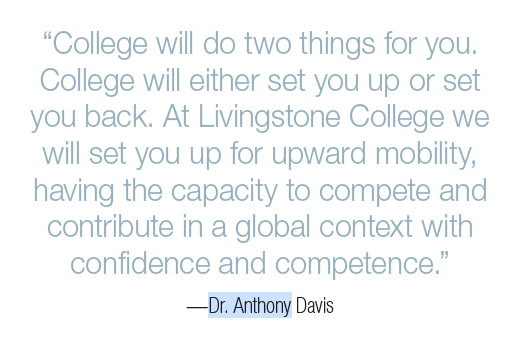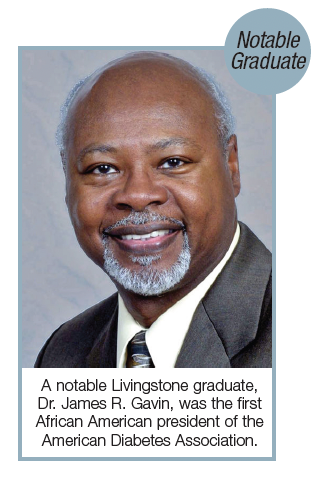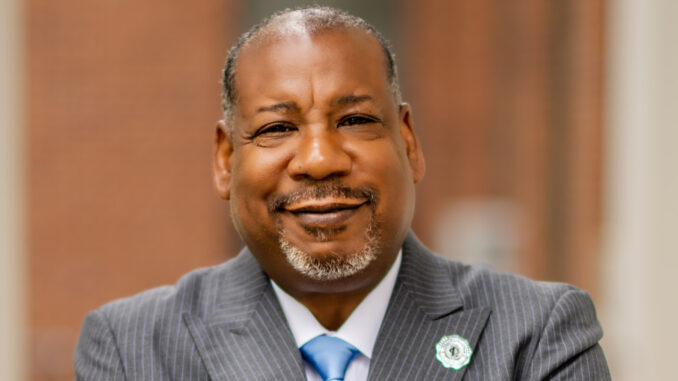
Above: Dr. Anthony Davis, President of Livingstone
College in Salisbury, North Carolina
By Angela Lindsay
The Livingstone College Board of Trustees announced that Dr. Anthony J. Davis would be become the 13th president of Livingstone College following a unanimous vote last year. This appointment was a crowning achievement for someone whose early childhood experiences could have derailed and discouraged many people.
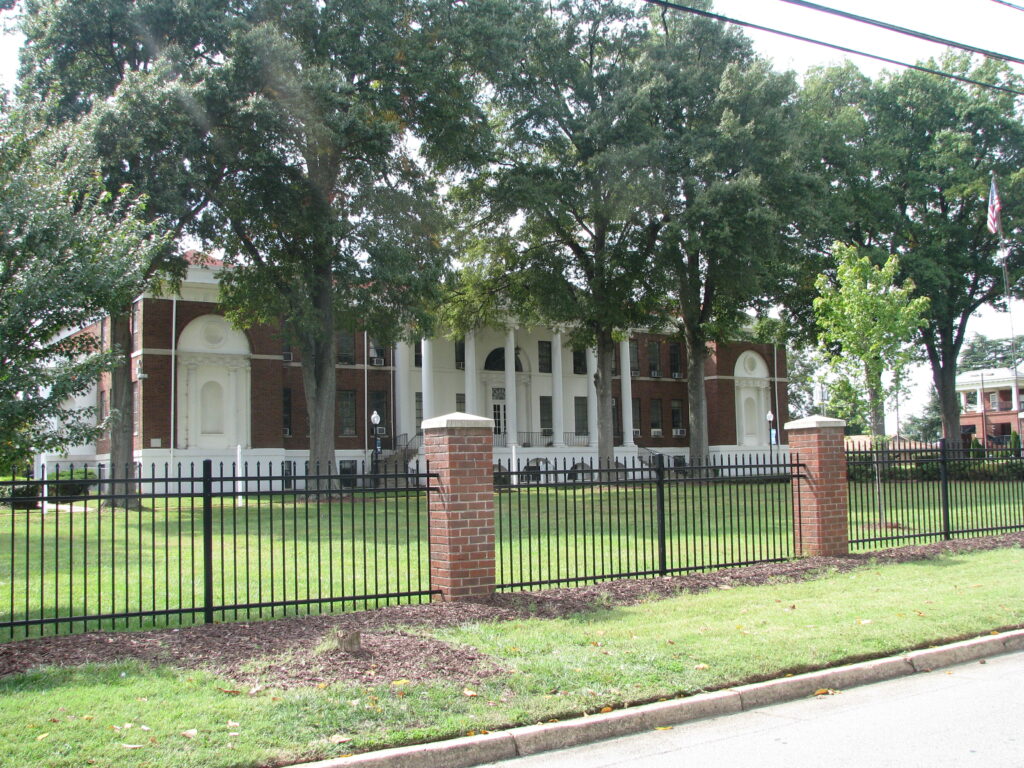
Livingstone college.
More than 20 years earlier, as Davis stood on the front lawn of Livingstone College in Salisbury, North Carolina in 2001, he declared — with a business administration degree in hand — that he wanted to be the president of Livingstone College. For the next 22 years, he began preparing to do just that by remaining “focused and resolved” that when the time was right, he would apply.
Growing up in New Haven, Connecticut’s oldest public housing development, the Elm Haven Housing Project, Davis learned early not only how harsh and unforgiving society can be but also how to persevere and surmount obstacles with a little help.
“Growing up here, I was an outsider and had to overcome being bullied and being different and being a fashion misfit,” he recalled. Davis said this all changed when he met some compassionate neighbors. “They put their arms around me and let everyone know with their family of six — if you mess with (me), you have to mess with (them),” he said. “Through the lens of this friendship, I realized that I had a right to exist, and I had to earn my respect. In fact, a life lesson I learned and continue to leverage even today is — one must be intentional to build rapport, develop relationships and earn respect.”
Davis was a ward of the state from the time he was born until 90 days before he turned 18. His biological mother gave birth to him 11 days after her 14th birthday and, on the night he was born, his maternal grandmother died, leaving his mother a ward of the state as well. Fortunately, Davis was placed with a loving foster parent who he says prepared him for emancipation.
“I can recall, while growing up, she reminded me that I do not have time to waste, and that education would be my key to emancipation,” Davis said. “So, although I had sports, education was the preferred tool, and sports took a back seat. My summers were spent preparing for the next academic year and, instead of going to the open gym to play basketball, my mornings and Saturdays were spent at the Stetson Library where I was responsible for not only reading a book, but comprehending it well enough to give my foster mother an oral book report – demonstrating mastery of the book.”
While his foster mother was instrumental in his rearing and educational foundation, he credits his biological mother, whom he met at age 24, as his inspiration. Though she became pregnant again at 16, his mother not only graduated from high school, but she also graduated from college and obtained both a master’s degree and an administrative certification. She would become a leading educator in the New Haven Public School System where “countless young people credit her with their academic success and remind Davis often that if it were not for his mother, (Wanda Gibbs), they never would have made it out of high school.”
One mentor, Bishop George W.C. Walker of the A.M.E. Zion Church, encouraged Davis to attend Livingstone College to earn his degree, telling him he “had so much to offer to the Christian Church and Zion Methodism.”
Livingstone College was founded as Zion Wesley Institute by a group of A.M.E. Zion ministers to train ministers in Concord, North Carolina, in 1879. The institute would ultimately close in Concord before Salisbury, North Carolina, (20 miles northeast of Concord) gave the trustees a generous donation of $1,000 and an invitation to relocate the school to Salisbury. The college re-opened in Salisbury in 1882.
In addition to his bachelor’s degree, Davis also holds a Master of Arts degree in philanthropy and development from St. Mary’s University in Minnesota, one of the only advanced degrees offered in this field. He attended the Fundraising School of Indiana University – Bloomington’s Center of Philanthropy and completed his doctoral work at the United Theological Seminary in Dayton, Ohio, earning a Doctor of Ministry degree.
In his first year as president, Davis secured more than $15 million in capital investment to support residence hall refurbishment; more than $1 million to support repairs related to infrastructure; an anonymous outright unrestricted $1 million contribution to support the college; and elevated the college’s state and national profile.
His vision for the rest of his tenure includes acquiring a suitable endowment to support students and their families, launching a middle school and high school charter school that will close the achievement gap in the community, and creating an ecosystem where Livingstone College will be known as “the career readiness historically Black, college and university (HBCU),” among other goals.
In fact, Davis said HBCUs in general serve an important role in the higher educational system and should receive support and funding sufficient enough to keep them viable.
“Without HBCU’s, we would not be competitive as a nation. The statistics prove that. However, all HBCU’s are not created equal. Schools like Livingstone serve a niche in the marketplace,” he said. He continued: “Ninety-seven percent of our students require Federal Financial Aid and Pell Grants. And 73 percent are first generation college attendees. Without Livingstone College, countless young people and their families would remain trapped at the bottom of the socioeconomic ladder with no means of escape,” he said.
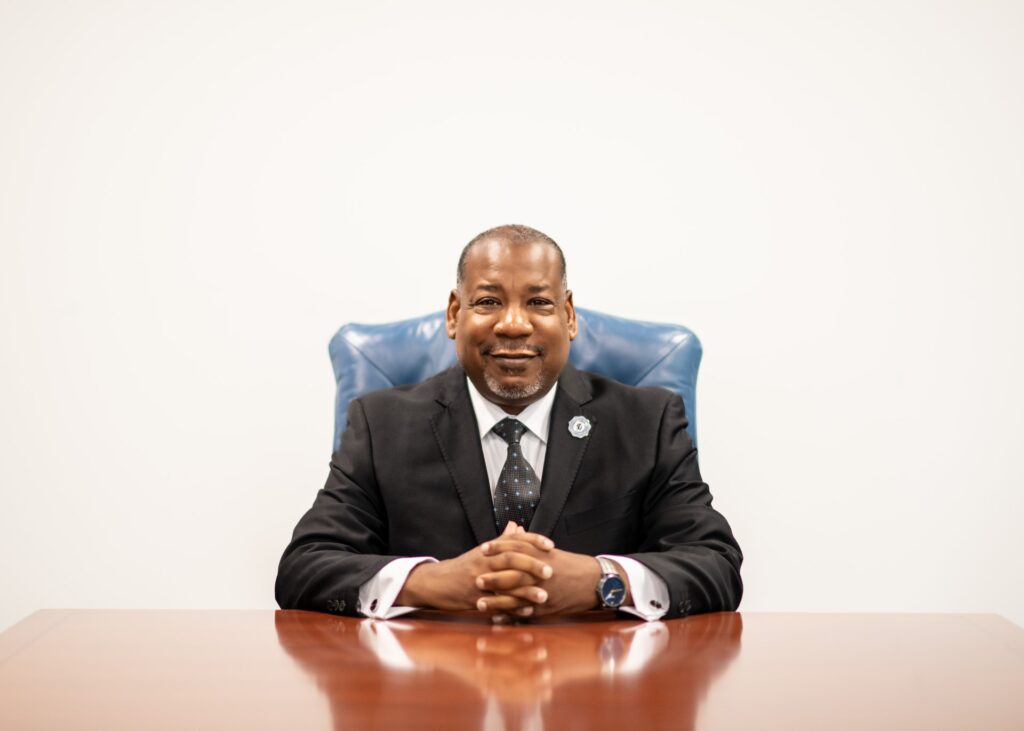
He reminds us that the U.S. News and World report ranked Livingstone College as one of the “top performers related to social mobility.”
Famous Livingstone College graduates include Elizabeth Duncan Koontz, the first African American president of the National Education Association and director of the United States Department of Labor Women’s Bureau; and Dr. James R. Gavin, who served as the first African American president of the American Diabetes Association. He is also a clinical professor of medicine at Emory University School of Medicine and at the Indiana University School of Medicine.
In addition, Davis would love to see Livingstone College become a “need-blind institution” with an endowment robust enough to address the need-based population they serve. So, for any students considering taking their education to the next level, Dr. Davis has a message:
“College will do two things for you. College will either set you up or set you back. At Livingstone College we will set you up for upward mobility, having the capacity to compete and contribute in a global context with confidence and competence. At Livingstone College we are committed to helping each student unlock their potential, unleash their power, and have their purpose unveiled. We’re Live! We’re Lit! We’re Livingstone!”



